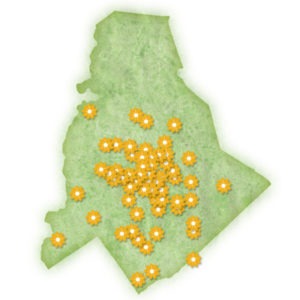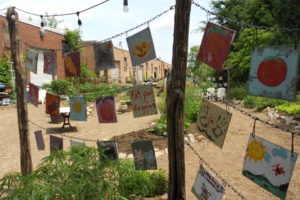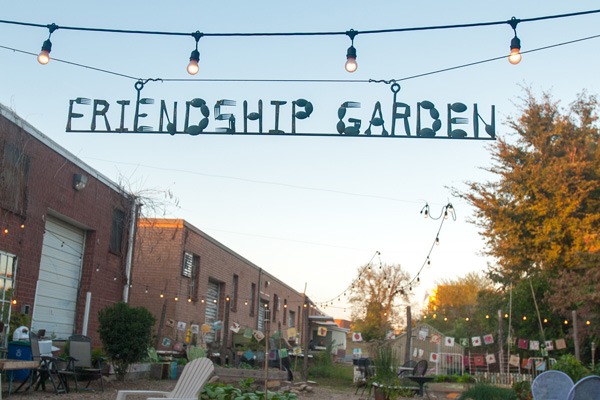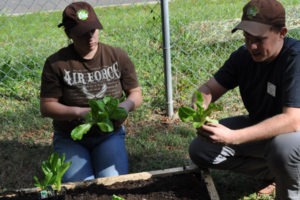here,there and everywhere
WRITTEN BY Laura Thompson
It’s springtime in Charlotte—a season filled with the glorious greens of the city’s rich tree canopy, the pop of yellow and white daffodils, and the abundance of budding plants and shrubs. Adding to the city’s extensive quilt of green are the more than 75 Friendship Gardens that are thriving in backyards, schools, faith-based grounds and community gardens. They are lovingly created and maintained by gardeners young and old, master gardeners and newbies.
Friendship Gardens’ seeds were sown five years ago through a partnership between Slow Food Charlotte and Friendship Trays. Their missions meshed: Slow Food Charlotte supports local farms and is committed to maintaining the connection between farms and the local marketplace. Friendship Trays—Charlotte’s local meals-on-wheels program—established the innovative and ingenious Friendship Gardens as a way to grow and provide healthy food for the nearly 700 meals that Friendship Trays provides daily.
“In 2009, Slow Food Charlotte was active in supporting and helping to create community gardens around town. We learned that Friendship Trays was starting a garden and we asked if we could help. One garden bed lead to another and another and soon we literally stumbled on the most obvious idea: What if we had lots of small gardens growing food and sharing some portion to benefit those who lack access to good healthy meals,” said Thom Duncan, founder of Slow Food Charlotte. “The innovation was symbiotic in its collaboration. Teach people to grow food—a Slow Food mission—and feed people good healthy food—a Friendship Trays mission. The partnership has become a perfect platform to build more collaborative relationships, of which there are many.”
As the idea of creating a network of community gardens developed, Friendship Trays and Slow Food Charlotte called on their community partners to make the network a reality. One of the garden leaders at the time was Henry Owen, who was working at a local church in mission outreach. One goal was to create a garden from which the produce was given to Friendship Trays. When Friendship Gardens was launched in 2010, Owen signed on as the Program Director.
“I was a second grade teacher and I had no experience with gardening. From the start, this has been a learning experience,” Owen said. “I have always been interested in working with nonprofits, particularly those engaging with the natural world, and it was exciting to work with a nonprofit that makes peoples lives better through food and their engagement with growing food.”
This engagement soon developed into a network of gardens. It became a reality in Spring 2010 when the partnership between Slow Food Charlotte and Friendship Trays was awarded a $70,000 grant from Charlotte’s Women’s Impact Fund. The idea was taking root and this grant was the perfect fertilizer. Friendship Gardens has not initiated all of the more than 75 gardens now in their network, but it has created programs to consistently provide educational and training opportunities to their gardeners.
“We work with our Garden Leaders to guide them on planting techniques as well as planting some of the most needed foods for Friendship Trays meals,” Owen said. “We encourage our gardeners to consider planting crops that are easiest to transport and clean before arriving in the kitchen.”
PASSION AND EDUCATION
As Friendship Gardens made its way into the community, it did so with a specific mission: to grow healthy food and to make it available to the community, especially to those with limited access; to create community around local food traditions; and to share knowledge and passion for sustainable food production. With their mission and goals in mind, a wide array of partnerships have developed and each is impressive.
“Each of our partnerships is different,” Owen said. “We work with schools, faith-based organizations, retirement communities, as well as therapy gardens for those battling addiction or residing at the battered women’s shelter.”
Annie Mae Patterson is an example of how Friendship Gardens reaps success. Patterson is a Charlotte resident with an extensive backyard garden. She grows radishes and collard greens, along with several other vegetables. Patterson also receives a daily Friendship Trays meal. After learning about the Friendship Gardens program, Patterson asked if she could become one of Friendship Gardens Backyard Gardeners so she could contribute her produce to the very program that brings her meals.
Another partnership came from an unlikely source—a local minimum security prison. “I received a call from the warden of a minimum security prison in Charlotte saying that he wanted to develop a farming program for his inmates. He said he could have 200 men plow the available 16 acres in a day,” Owen said. “This was overwhelming. We weren’t prepared to handle that level of farm maintenance and production, but it did give us the opportunity to develop our first Urban Farm.”
 Working with eight inmates twice a week, Owen soon developed one acre on the prison grounds. It was an opportunity to expand Friendship Garden’s mission of teaching people how to grow their own food and how to develop a passion for gardening. Inmates also gained job skills that could be beneficial after their release and to give them the ability to give back to their community. Over time, Owen worked with these men to create their own 10 x 5-foot gardens where they could make all the decisions about what they wanted to grow. They grew squash, cucumbers and lettuce. One man chose to plant his entire garden with watermelons.
Working with eight inmates twice a week, Owen soon developed one acre on the prison grounds. It was an opportunity to expand Friendship Garden’s mission of teaching people how to grow their own food and how to develop a passion for gardening. Inmates also gained job skills that could be beneficial after their release and to give them the ability to give back to their community. Over time, Owen worked with these men to create their own 10 x 5-foot gardens where they could make all the decisions about what they wanted to grow. They grew squash, cucumbers and lettuce. One man chose to plant his entire garden with watermelons.
“It was incredible to see families came for visitation days, and the families would bring their incarcerated relative McDonald’s. These men, in return, would hand their families fresh, locally grown produce,” Owen said.
The prison closed in 2012, but the men’s relationships to Friendship Gardens’ remain. “I have heard from a few of these men [since the prison closure],” Owen said. “A couple of the men told me that they have enrolled in the Community Culinary School of Charlotte, which offers workforce development skills through the culinary arts. Several who enrolled in the school have gone on to become Friendship Trays chefs.”
It all comes full circle.
EVER-GROWING COLLABORATION
While great work had been achieved at the prison, Friendship Gardens was soon looking for a new space for its Urban Farm. A lucky turn of events came soon after Owen participated in a local event, SEED20, sponsored by Social Venture Partners, a local venture philanthropy organization. Following his participation, Owen received a call from Wells Fargo’s Community Relations office saying that they had heard his pitch at the SEED20 event and that they wanted to work with Friendship Gardens to find a new space for their Urban Farm.
“Because of my SEED20 pitch, Jay Everett at Wells Fargo Community Affairs knew of our plans to establish an urban farm as part of the Friendship Gardens program,” Owen said. “Months later he called me and said ‘are you still looking for a farm space? Wells Fargo may be in a position to help with start up funding.’ It is was a great phone call!”
This partnership was invaluable. After some searching, Friendship Gardens found a defunct greenhouse and two and a half acres of land at a local, urban high school. It also allowed for a new and unique collaboration to evolve: private funding for a nonprofit group using public school land and developing broad farming capabilities that would, in return, provide produce for more than 700 meals daily.
Friendship Gardens now has three acres for its Urban Farm at Charlotte’s Garinger High School, tucked behind the baseball field. The farm is still in its infancy and has not yet completed its first full year of farming. But it’s quite a sight: a 100 x 100 foot field with four 40 x 40 plots; an established arbor of fruit trees; newly donated fruit trees creating a second arbor; a shed, complete with solar panels and a rain water container system that will water the fields; and a restored greenhouse that will house aquaponic growing pools.
“We have some great partnerships with the local community college, who has had a horticulture class complete their service learning by building the plumbing system inside the greenhouse,” Owen said. “UNC Charlotte’s engineering program helped us to build the shed, install the solar panels and figure out the rainwater capture system.”
Locating the farm on the high school grounds has also allowed for Friendship Gardens to extend its mission of providing learning opportunities. Primarily led by Garinger Garden Leader Bobbie Mabe, the high school students have installed raised beds for gardening and a geometry class assisted in the layout and placement of the fruit trees.
“I believe that our program offers a wide range of positive experiences for those involved, including hands on learning, vocational skills, stress reduction, a sense of community/ belonging—opportunities for success academically, socially, and emotionally,” Mabe said. “I’m doing this mainly by working with teachers, in all class subjects, to write gardening into curriculum in a meaningful way, offering after school garden club, and working with Henry to connect students to the farm in any way we can.”
The greenhouse, in particular, will allow Friendship Gardens to develop a consistent growth environment for some of Friendship Trays’ most needed produce, in particular lettuce, which is included in almost every Friendship Trays’ meal. Another powerful point of impact of the new Urban Farm is the creation of summer employment opportunities for these high school students. Partnering with the Charlotte Mayor’s Office Youth Employment Program, these students will have an opportunity to apply for five summer positions, which will give them on-the-job training and solid summer work experience.
“There are other communities that have created similar networks for growing and sharing produce. Milwaukee and Raleigh have similar programs,” Owen said. “But I don’t know of any other community—regionally or nationally—who is doing exactly what we’re doing. Which is daunting—and exciting.”
GROWING PARTNERSHIPS
Friendship Gardens has established innovative and creative partnerships with other Charlotte nonprofit organizations. They include:
COMMUNITY CULINARY SCHOOL OF CHARLOTTE The school was created when a local restaurant owner saw an opportunity to put a new state-of-the-art kitchen to work during its idle afternoon hours by turning it into a training kitchen. It’s now a full-time culinary school that gives students work-force ready skills. The meals are created for Friendship Trays using ingredients from the Friendship Gardens.
FRIENDSHIP GARDENS TO GO From March through October, Friendship Gardens partners with CATS (Charlotte Area Transit Authority), to sell fresh, locally-grown produce at Charlotte’s central bus terminal.
QUEEN CITY MOBILE MARKET Expanding the idea of taking locally grown fruits and vegetables out to Charlotte’s food deserts, Friendship Gardens has partnered with local chef Barry Dubois to create a “mobile farmers market on wheels.” Similar to the food-truck concept, Dubois will stock a mobile “grocery” with Friendship Gardens’ produce and then will drive it to area food deserts and provide education about healthy eating, sharing recipes and selling produce.

Leave a Reply